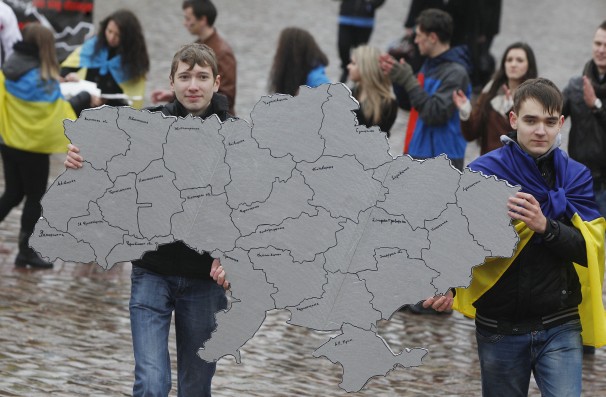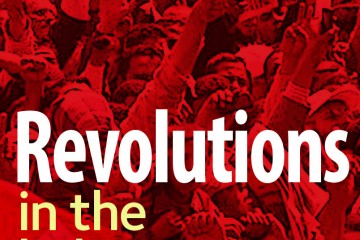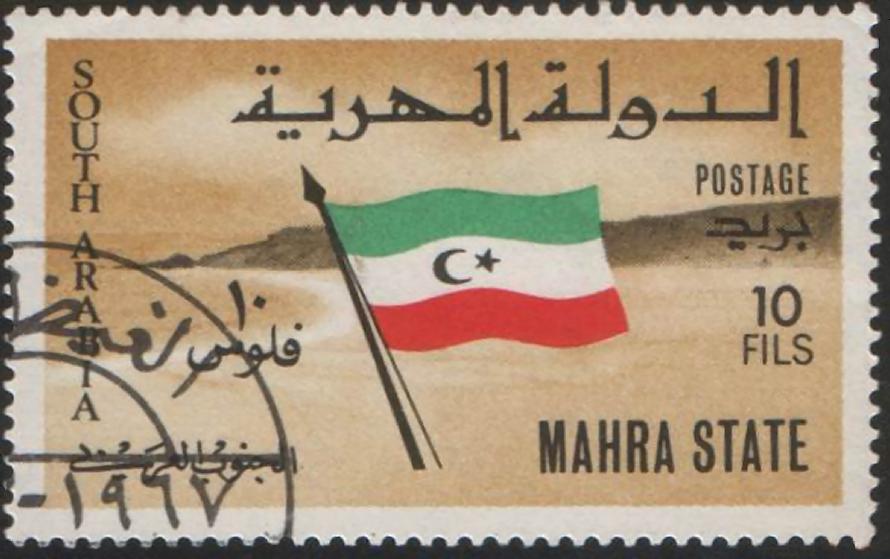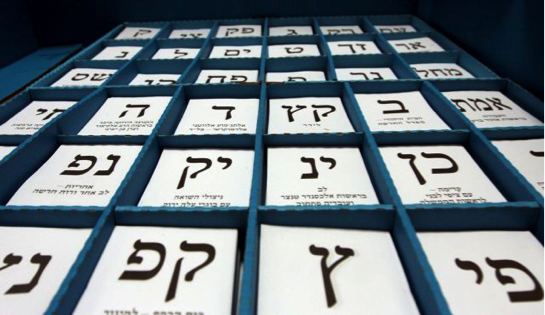
Building a federal Ukraine?
The idea of a remaking of Ukraine’s constitutional order along federal lines is beginning to gain traction. On March 18, Ukrainian Prime Minister Arseniy Yatsenyuk reached out to Russophones in the eastern and southern regions, announcing that “new measures linked to decentralization of power will be reflected in a new constitution.” Senior U.S. administration officials have encouraged the Ukrainian leadership to consider constitutional reform along federal lines.
On March 17, the Russian Foreign Ministry proposed the establishment of an international “support group” to manage the crisis. The list of items that Russia wants to be the basis for negotiation in Ukraine includes a new federal structure for Ukraine and the recognition of Russian as a second language.
Until recently the federal idea was an anathema among the greater part of Ukraine’s political elite. As a constitutional form it was largely rejected in the 1990s, partly as a negative reaction to the experience of Soviet federalism, and partly from fear of its centrifugal potential for splitting the country along ethnolinguistic fault lines.

The insecurity of a security state: What can Hannah Arendt tell us about Egypt?
In Egypt, it is clear that constructive results are not going to materialise anytime soon. Increasing state violence, arrests and intimidation have no clear logic beyond an attempt by the security apparatus to regain power and tighten control over the economy. It is an outworn order that risks collapsing.
While the regime does have a serious security issue on its hands, namely the Sinai-based terrorism that has now spread to Cairo, the regime is increasingly blurring the lines between terrorism and anyone who opposes the official line. Labelling the Muslim Brotherhood as a terrorist organisation, outlawing anti-regime protests, cracking down on NGOs and the clampdown against anti-regime activists and journalists are indications that the security state is disintegrating. The regime is carrying out violent measures against Islamists and youth – two major groups that cannot afford to be alienated – signalling the regime’s struggles to control a significant segment of the population via peaceful means.

What an El Sissi presidency would mean for Egypt’s relations with the Gulf States
The announcement by Egypt’s Defense Minister, now Field Marshall, Abdel-Fattah El Sissi that he would be running for president was greeted with joy and with apprehension, not only in Egypt, but also in the Gulf States. If current trends hold, it seems increasingly likely that El Sissi will be comfortably elected to serve as president of Egypt for at least the next four years. Egypt’s relations with the Gulf States under a potential El Sissi presidency will largely be shaped by the positions these states have taken in the past few months.
Saudi Arabia, Kuwait, the UAE and Bahrain, who considered the Muslim Brotherhood to be a significant domestic threat, have strengthened relations with Egypt following the overthrow of former president Mohammed Morsi. Saudi Arabia, Kuwait and the UAE, who welcomed Morsi’s overthrow immediately pledged $12 Billion to post-Brotherhood Egypt, increasing their assistance in the subsequent months. If elected, President El Sissi will look to build on the current relationship with these states, possibly by visiting Riyadh, where he previously served as military attaché, and Abu Dhabi soon after the election. Although the UAE’s Prime Minister stated in an interview with the BBC that he “hopes (El Sissi) remains in the military, and that another person [runs] for the presidency”, a clarification was soon issued by the official news agency saying that the “brotherly advice is that General al-Sissi should not run as a military man for the post of the presidency”. El Sissi has already stated that Saudi’s support for Egypt will “never be forgotten” and expressed gratitude for the UAE’s aid.

National Dialogues and Dilemmas: Reflections on Libya and Yemen
The Arab uprisings, initially perceived as one unit of analysis, have gone through a rite of passage and identified themselves as distinct from one another; it is no longer logically sound to talk of one “spring”. Nevertheless, it is instructive to extract lessons learned from each experience and place them into conversation with one another. An Arab dialectic seems possible instead of a unified discourse on change and transitions. Libya’s ‘national dialogue’ has been launched in the hope of carving out a space of peace across the country and for developing a form of consensus on what is perceived as a reborn Libyan nation, post-Qaddafi. The National Dialogue Preparatory Commission’a (NDPC) Chairman Fadeel Lame emphasised that Libya needs to “move from one stage to another and from one situation to another and that this transition could be achieved only through the power of dialogue.”[1] Earlier in September 2013, Tarek Mitri, who heads the UN Support Mission in Libya, described it as a process that “would give voice to many Libyans and opens a space that does not exclude any of those who may have contributions to make to public life and are otherwise isolated, separated or entrenched in their partisan attitudes… [to] promote a national capacity to address urgent priorities and ensure public support to the efforts of state-building.”
The need for dialogue is indisputable in a country that seems ridden with conflict. In Tripoli, separatist movements gaining ground in the eastern part of the country. General instability highlights the urgency for dialogue – and the difficulties. Recently, militias from Misrata opened fire on peaceful protestors in Tripoli who were calling for the departure of militias and the restoration of peace. According to one account, more than 40 were killed and 400 wounded in the clashes.[2] The General National Congress (GNC) and government agencies froze; it was only through the intervention of local councils and civil society that an end of violence was reached.[3] As described by the reporter: “There was a tense calm in Tripoli on Sunday after more than 48 hours of bloodshed. Civil-society and community leaders abided by a general strike that coincided with a national mourning period for those slain. Shops were shut and normally busy commercial streets were devoid of traffic on the first day of the working week, witnesses reported.”
The question here then is not about need – in an ideal world, developing consensus among the Libyan people towards state building and a national identity would be the way out.
It is about capacity.

Yemen’s Eastern Province: The people of Mahra clearly want independence
In late November 2013, I was invited by a cross-tribal delegation in Yemen’s eastern province of Mahra to explain the results of a public opinion survey that I had completed there with their help earlier in the year. Owing to heightened security risks from entrenched interests and al-Qa’ida operatives, around 20 vehicles of trusted tribesmen, armed to the hilt, had made the journey to meet me at the desert crossing between Oman and Yemen. We drove through the night to a fortified compound just outside Mahra’s capital, al-Ghayda. This unfurnished fortress was to be the centre of activity for me and about 50 armed men for the next week. Strangely, I had never slept so well as I did on my roll-up mattress on the floor, safe in the knowledge that three guards remained outside my window all night and a dozen more on the roof above me.

Can democrats learn from Machiavelli?
When politicians are described today as ‘Machiavellian’ the implication is that they are no more than cynical graspers at power for its own sake. Most historians of political thought have long argued that Machiavelli’s own views and politics were more complex than this. In his 2011 book, Machiavellian Democracy (previously reviewed for OurKingdom by Guy Aitchison), the political theorist John P. McCormick offers an innovative reading of Machiavelli. According to McCormick, Machiavelli was not only a republican thinker, but by the standards of his day, and our own, a radically democratic one. Moreover, some of Machiavelli’s ideas, such as his advocacy of plebeian, tribunate institutions, arguably remain relevant to today’s discussions of democratic renewal. Robert Jubb and Stuart White interview John here for the ‘Democratic Wealth’ series.

One Year In: Assessing the 19th Knesset
The last legislative elections in Israel were held one year ago today. If the 19th Knesset survives a full four-year term, it is now quarter-way through its life. It is far too early to begin predicting the results of the next election, but this is an opportune moment to examine the changing contours of the Israeli political map, and see to what extent the big stories of the last year have changed Israelis’ opinions about the leadership they want for their country. Eylon Aslan-Levy looks at the polls to examine how the fortunes of Israel’s political parties have altered in the year after the last elections.

Q&A with Dr Cristina Parau: Why do politicians let judges have so much power?
Dr Cristina Parau, Department Lecturer in European Politics and Societies at Oxford University, recently edited a special issue of the journal Representation. This issue focuses on the phenomenon of judicial activism in the political sphere. It brings together scholars from different disciplines that hold different perspectives on the judicialisation of politics. It focuses on the contrasts and complementarities of law and politics as modes of democratic representation.
According to Dr Parau, “this special issue seeks to advance our understanding of the judicialisation of politics by bringing together a diverse group of scholars who take different perspectives and apply different methods to investigating the phenomenon and and its impact on representative democracy. The transfer of policy-making power from popularly elected representatives to a judicial elite would seem to weaken democracy in a quite straightforward, zero-sum way, contributing to Europe’s already destabilising democratic deficit. On this account, a renewal of parliamentarism is the only effectual and legitimate cure. On the other hand, ‘representative democracy’ has been criticised since the eighteenth century as elite rather than popular rule; Aristotle classified it as ‘oligarchy’. Representation has defects that might be remedied by judicial intervention. Some scholars have suggested that judicialisation provides a venue for the more active participation of citizens marginalised by the failures of representation; while others even see in judges a form of representativeness with unique properties. The articles in this Special Issue probe these accounts.”
I recently asked her a few questions about the project.









